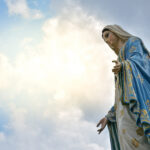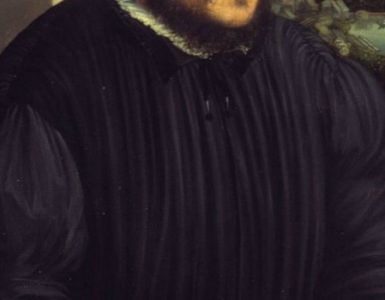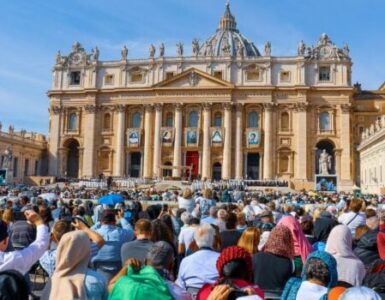In the four Gospel accounts, Jesus refers to himself as the Son of Man over 80 times. But the term did not originate with Jesus. It is used 107 times in the books of the Old Testament.
It is clearly a messianic title in the Old Testament, especially in the Book of Daniel. Jesus by referring to himself in that manner is claiming his Messiahship and, by extension, his role in the redemption of all humanity. While he is a divine person he has two distinct natures; human and divine which are separate but indivisible.
It is by virtue of his human nature that he is able to offer himself as the pure sacrifice to God the Father to make atonement for our sins and, by virtue of his resurrection, to restore us as adopted sons and daughters of God the Father. He alone by virtue of his two natures is able to do this!
In the Book of Genesis, when speaking to the serpent immediately after the fall of our first parents God said, “I will put enmity between you and the woman, and between your seed and her seed; he shall strike at your head, while you strike at his heel” (Gn 3: 15). Many of the early Church Fathers, saw in this passage of Genesis, often referred to, by them, as the “protoevangelium”, the first announcement of the “Good News” of our redemption.
It’s reasonable to ask, why does God refer to a woman in this important passage? Afterall, it is God’s Son, that is in turn the woman’s male offspring, who shall strike at the serpent’s head. The answer quite simply, is because God chose that his only begotten Son would receive his human nature from a woman. And that woman is Mary. Pure and gentle, immaculate from the first moment of her conception. The true tabernacle, that was destined to bear the Son of God in her womb for nine months!
The very next time in sacred scripture that Mary is referred to as the woman is at the wedding feast at Cana. Mary realized that the wine was running out. Jewish wedding celebrations, at that time, lasted an entire week and wine was an essential staple at all weddings. This predicament, if not remedied quickly and discreetly, would have caused considerable embarrassment to the bride and groom and their families.
Mary approached Jesus to inform him of this predicament, and said “They have no wine.” Jesus responded by saying to his mother “Woman, how does your concern affect me? My hour has not yet come.” Mary did not hesitate but told the servers, “Do whatever he tells you.” And we know that Jesus performed the very first of his miracles, or signs as St John describes them, at this wedding feast at Cana.
On its surface, Jesus’ response to his mother appears to be disrespectful. This mistaken connotation is largely the result of Jesus’ use of the word “woman” in addressing his mother. In the English lexicon of our modern day, addressing someone as “woman” has a very negative inference. It conjures up a sense of angst in the person addressing a woman in that manner.
But is that what Jesus is really doing? Jesus would never be disrespectful of his mother. To act in this manner would be a violation of God’s fourth commandment which states “Honor your mother and your father”.
Recall that Jesus also refers to Mary as “woman” at his crucifixion when he said to her, “Woman behold your son.” Notice that the wedding feast at Cana marks the beginning of his public ministry, while his crucifixion ends his earthly life. If you will, these two references to “woman” serve as markers at the beginning and end of his public ministry. These are the only two times in the four gospel accounts that Mary is referred to as woman by Jesus. Is this coincidental? I think not.
So by what means does Jesus’ response to his mother accord respect, not condescension. What if Jesus were actually informing his mother that if he granted her request their life together, as they knew it to that point in time, would come to an end. Knowledge of that miracle of changing water into wine would quickly spread, far and wide, making their life together, as before, impossible.
This miracle, if performed by Jesus, would necessitate the forfeiture of the precious little time they had left together before his hour would indeed come. His use of the term “woman” would make clear to her this point. He is at once, notifying her of this and, affording her the right to choose when his public ministry would begin.
Mary does not hesitate but chooses to aid the bride and groom in avoiding an embarrassing predicament coming to fruition. This, at great cost to herself. Truly selfless in her concern for others. Imagine her feelings of sorrow at the moment of realization that this choice of hers would have, and yet she did not hesitate. Love is giving of self and Mary is all love!
Mary is also referenced in chapter 12 of the Book of Revelation “as the woman clothed with the sun, with the moon under her feet, and on her head a crown of twelve stars.” St. John is clearly depicting Mary, in this passage, as Queen of heaven. This chapter goes on to say “a red dragon appeared before the woman. The red dragon (which is an image of Satan) had designs on devouring the child when she was to give birth”. But then St. John states “She gave birth to a son, a male child, destined to rule all nations with an iron rod. Her child was caught up to God and his throne.”
Do you see the parallels between the “woman” of Genesis and the “woman” of Revelation? Both begin with a “woman” who will bear a male child. Who will conquer Satan and his minions and rule on his throne forever.
And just as Jesus referred to the “woman” of Cana at the inception of his public ministry and the “woman” at Calvary at the end of his earthly life, so too the “woman” of Genesis is referenced at the very beginning of the bible and the “woman” of Revelation at the very end of the bible. These are the only four times Mary is referred to as “woman”. The perfect symmetry of those references is undeniable! Their placement infers premeditation by God, of Mary’s role in his plan for our salvation!
At Cana, Jesus turned water into wine, and at the last supper he turned wine into his precious blood and on Calvary blood and water would flowed from his side when all had been accomplished. Water, wine, and blood; a trilogy of natural substances that God used to inaugurate the New and Eternal Covenant!
So necessary was Jesus’ human nature in order to accomplish our salvation. And his human nature was received through a “woman”. Not just any woman, but one chosen by God, and who by her fiat, freely chose a path of sorrows; to accompany her Son in his great redemptive work of our salvation.
I think, St Paul said it best and most succinctly when he wrote “When the designated time had come, God sent forth his Son, born of a woman, born under the law, to deliver from the law those who were subjected to it. So that we might receive our status as adopted sons and daughters.”
Mary, who is all love, is so necessary in our lives today. A world sadly devoid of love. Let us allow the Woman to teach us how to Love as we ought…










